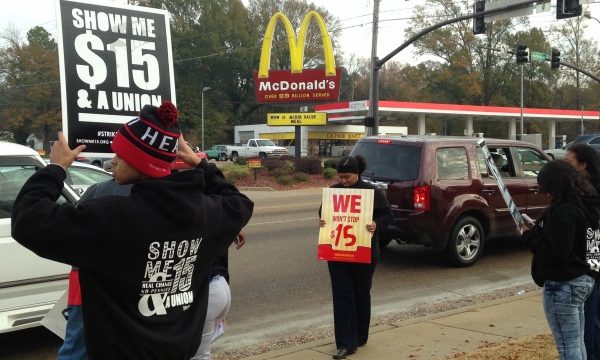Mississippi fast food workers protest for a ‘livable’ wage

We WANT $15: Protesters advocating for higher wages for fast food workers hold up signs during a rally at a street corner in Jackson, Miss.
By Steve Wilson | Mississippi Watchdog
If fast food workers get a pay boost and union representation, your Big Mac craving could get a lot more expensive.
And a lot more of those workers could be out of a job.
A group of pro-union protesters joined a nationwide protest Thursday on a street corner in Jackson, Miss. Thursday. About 23 held up signs advocating a $15 per hour wage and union representation.
“I’ve worked in fast food and I know if the minimum wage was $7.25 then, inflation has come around and it’s harder to support your family on $7.25 (an hour),” said Bryan Eason, one of the organizers of the protest. “Workers deserve a livable wage. The job they do in fast food is so difficult. McDonald’s is a billion-dollar company. They can support their workers with a livable wage.”
It almost paints a picture of these companies like Scrooge McDuck from Disney’s “Duck Tales” cartoons, swimming through an enormous vault of money they’re hoarding and keeping from the workers.
“I think they’ve got enough leeway, enough of a head start to do something,” Eason said. “For years, they’ve cut benefits, hours for workers, for more profits. This rainy day fund they have, they could liquidate that just a little bit to give us a livable wage.”
Profits? The purpose of a business is to provide a profit for its shareholders by maximizing its revenue and minimizing the costs, such as labor. It’s not a charity.
While McDonald’s is a billion-dollar corporation, with 35,864 restaurants in 119 countries as of Sept. 30, it isn’t exactly flush with cash these days. The company revealed in its latest 10-K filing with the Securities and Exchange Commission that its U.S. sales have slumped 3.3 percent in the past quarter and 2.2 percent in the past nine months.
This is in addition to higher commodity costs — 2.5 percent to 3 percent in the U.S. — and increased selling, general and administrative expenses — estimated by the company to be about 4 percent to 5 percent globally.
Wendy’s, which operates 6,532 restaurants, most of which are franchises, reported its sales in the quarter ending Sept. 30 were down more than $148.9 million compared with the same period last year, according to its 10-K filing.
EXPRESSION: Twenty-three protesters held up signs on a busy Jackson, Miss. street corner. They want more pay and unionization for fast food workers.
Kelsey McLaurin, who works at a McDonald’s restaurant in Jackson, said her pay was not enough for necessities as she attends cosmetology school. She also said the work environment can be hostile and merits a higher rate of pay.
“I’m here in agreement with a union because it’d make us feel safer about voicing our opinions about being attacked by our employers or other employees or the fear of being fired,” McLaurin said. “It feels like we’re going through a struggle just to get that $7.25 an hour and it goes to nothing. It might go to bills and not pay all of them. There are people there who have children who can’t provide for their families or themselves.”
What’s livable? A $15 hourly wage would put fast food workers in Mississippi just $2.34 below the state’s average hourly wage, according to data from the federal Bureau of Labor Statistics. While $15 per hour sounds reasonable, it would put fast food workers in some rarefied air, making more than jobs that require long apprenticeships or technical school. Or are even dangerous. Those jobs include:
- Audio and video equipment technicians — $12.08 per hour
- Phlebotomists — $12.20 per hour
- Corrections officers — $13.05 per hour
- Locksmiths — $14.32 per hour
- Motorcycle mechanics — $14.77 per hour
- Security and fire alarm installers — $14.87 per hour
- Stonemasons — $14.92 per hour
Fast food jobs aren’t designed to provide a “living” wage. Rather, they’re meant as entry-level employment to teach young workers basic skills such as responsibility, teamwork and work ethic as they move up in the work force. But if these companies are forced to raise the price of labor far above what the market will bear, they will have done two things: Increase costs and reduce their labor force.
A study by the National Restaurant Association, a lobbying group for the restaurant industry, found that a $13 per hour minimum wage would lead to the loss of 80,000 jobs. Most of those workers would be younger than 21. The youth employment rate (workers ages 16-24) has already been in decline since the late 1980s, going from a range of 81 percent to 86 percent in the Me Decade to 51.9 percent this July. The middle of the summer is considered peak employment time by the Bureau of Labor Statistics.
In fact, fast food companies are experimenting with robots, a move with obvious implications.
Get regular updates on Mississippi through our Facebook or Twitter accounts







